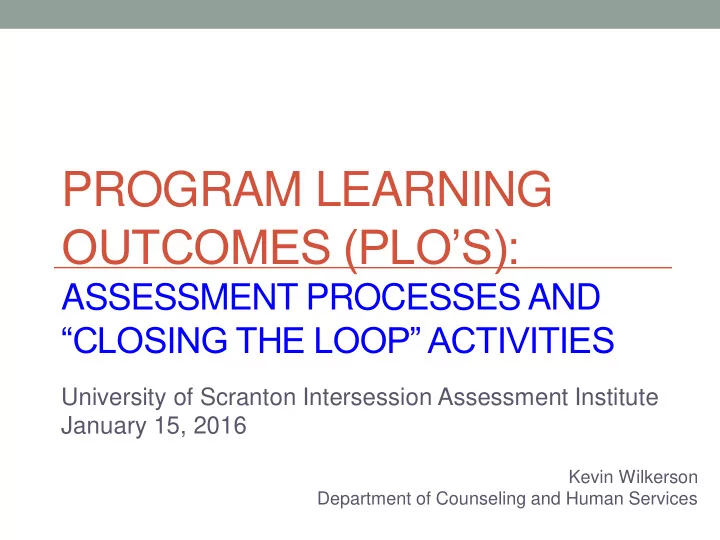

PROGRAM LEARNING OUTCOMES (PLO’S): ASSESSMENT PROCESSES AND “CLOSING THE LOOP” ACTIVITIES University of Scranton Intersession Assessment Institute January 15, 2016 Kevin Wilkerson Department of Counseling and Human Services
Objectives • Outline CHS Program Learning Outcomes (PLO’s) and Assessment Tools for master’s degree programs in Clinical Mental Health Counseling, Rehabilitation Counseling, and School Counseling • Present an overview of the department’s assessment cycle • Explain the departmental process for sustained, continuous assessment work • Share sample work (PLO 4: Research)
Session Learning Outcome • Participants will be able to apply the concepts of the Assessment Process utilized by the Department of Counseling and Human Services to their own programmatic and departmental work.
CHS Program Learning Outcomes (PLO’s) Students in the master’s degree programs (CMHC, RC, and SC) within the Department of Counseling and Human Services at the University of Scranton will: • Demonstrate master’s -level professional counseling dispositions (PLO 1) • Demonstrate master’s level theoretical knowledge and competencies in counseling domains (PLO 2) • Demonstrate , apply, and evaluate master’s level theoretical knowledge and competencies in clinical practice with respect to counseling modalities (PLO 3) • Formulate , conduct, and evaluate master’s level research procedures and assessment processes (PLO 4) • Design, develop, and implement all aspects of the ASCA National Model (PLO 5- School Counseling Program Specific)
“PLO’s” and Related Assessments • “Dispositions” (PLO 1) - Professional Counseling Students Dispositions Form • Assessment conducted in COUN 595/96/97 Internship • 11 domains (4-point Likert Scale) • Commitment to Wellness, Commitment to Learning, Academic Competencies, Clinical Competencies, Professional Identity, Personal Maturity, Responsibility, Interpersonal Skills, Communication Skills, Problem Solving, and Stress Management • “Theoretical Knowledge” (PLO 2) – Counselor Preparation Comprehensive Exam (CPCE) • Assessment conducted towards conclusion of program • 8 Domains (150-question nationally normed exam) • Human Growth and Development, Social and Cultural Diversity, Helping Relationships, Group Work, Career Development, Assessment, Research and Program Evaluation, Professional Orientation and Ethical Practice
“PLO’s” and Related Assessments (cont.) • “Practice” (PLO 3) – Final Counseling Practicum Competency Checklist • Assessment conducted in COUN 590/91/92 Practicum • 10 Domains (5-point Likert Scale) • Ethics, Ability to Establish and Maintain a Relationship, Mastery of Variety of Counseling Techniques, Ability to Facilitate Client’s Awareness of Needs and Planning of Goals, Testing/Assessment Competency, Staffing and Case Presentation Competency, Termination or Referral of Client, Theory and Practice Brought Together in Producing Client Change, Identifies Professional Role and Function and Integrates this as a Person, and Multicultural • “Research” (PLO 4) – Feature Assignments • Assessment conducted in COUN 505/535 Research • 3 Course-based Projects (School Counseling Program) • Needs Assessment/Program Evaluation Project, Evidence-Based Practice/ Research and Development Project, and Comprehensive Data Analysis Performance
“PLO’s” and Related Assessments (cont.) • “National Model” (PLO 5- School Counseling Program Specific) – Praxis Exam, Alumni and Employer Surveys • Praxis assessment conducted towards completion of program • Surveys conducted with 2- and 5-year Alumni and associated Employers
Assessment Cycle • 3-Year Feedback Loop • Year 1: 2014-2015 • PLO’s 1 & 2 - Analysis, Reports, Recommendations, and Faculty Approval • Year 2: 2015-2016 • PLO’s 1 & 2 - Discuss and Implement Corrective Actions • PLO’s 3 & 4 - Analysis, Reports, Recommendations, and Faculty Approval • Year 3: 2016-2017 • PLO’s 1 & 2 - Continue Corrective Actions, Maintenance • PLO’s 3 & 4 - Discuss and Implement Corrective Actions • PLO 5- Analysis, Reports, Recommendations, and Faculty Approval • Year 4: 2017-2018 (repeat) • PLO’s 1 & 2 - Analysis, Year 1 Comparison Reports, Recommendations, and Faculty Approval • PLO’s 3 & 4 - Continue Corrective Actions, Maintenance • PLO 5- Discuss and Implement Corrective Actions
Departmental Process • Standards Work Group (meets 2x/month, 1.5 hours) • MEMBERS • Department Chair, Program Directors, Additional Faculty • FUNCTIONS • Assessment (analysis, reports, and recommendations) • Policy development • Accreditation compliance • P resent “draft” documents to department for approval • Represent department at college and university levels • Assessment Action Committee (meets 1x/month, 1.5 hours) • MEMBERS • ALL CHS Department faculty (approved to commence Spring, 2016) • FUNCTIONS • Discuss and implement corrective actions based on annual PLO analyses, reports, and recommendations • Create a department-wide culture of assessment
Example: “Research” (PLO 4) F12-F14 (3-year cycle)
Results: “ Research” (PLO 4) F12-F14 (3-year cycle) Overall means 100.00 90.8 90.6 89.3 90.00 80.00 70.00 60.00 50.00 40.00 30.00 20.00 10.00 0.00 Project A: Needs Assessment/Pro-gram Project B: Evidence-Based Practice Mean Performance Evaluation: Data Analysis Mean Evaluation Mean Scores Scores Scores OVERALL (N = 46)
Results: “ Research” (PLO 4 ) F12-F14 (3-year cycle) Students falling “Above” or “Below” a final score of 84% (Overall N = 46) 90.00% 84.80% 80.00% 76.10% 71.70% 70.00% 60.00% 50.00% 40.00% 28.30% 30.00% 23.90% 20.00% 15.20% 10.00% 0.00% Project A: Needs Assessment/Pro-gram Project B: Evidence-Based Practice Performance Evaluation Evaluation Above 84% Below 84%
“Research” PLO 4: Abbreviated Recommendations and “ Closing the Loop” • Establish baseline performance expectations • Establish benchmark target goals for each assessment • Standardize current “Feature Assignments” in order to insure greater reliability and validity for future comparisons (Implemented, F16) • Develop more formal instructor consultation to assist students prior to submission (Implemented, F16) • Conduct sub-construct/item analyses for each assignment to determine where students are struggling and utilize outcomes to focus instruction with increased intention.
QUESTIONS/COMMENT S GOOD LUCK!
Recommend
More recommend